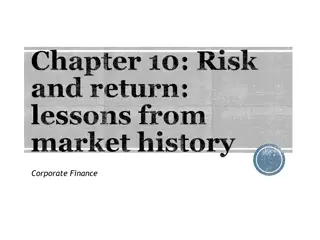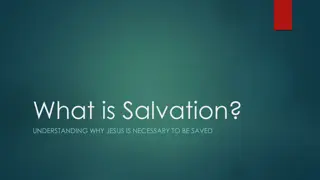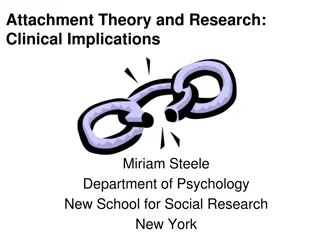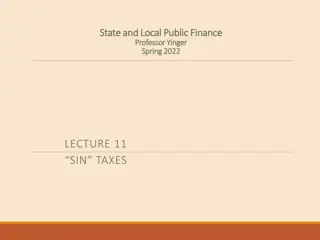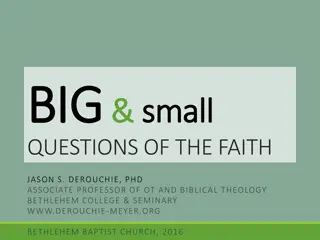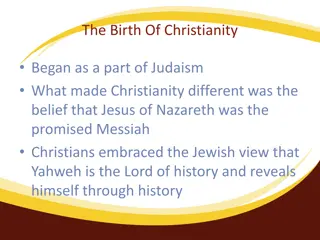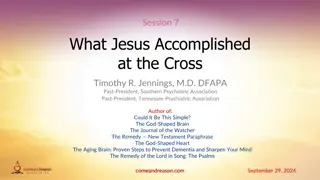
Understanding Jesus' Relationship to God and Man
Explore the unique aspects of Jesus' identity as the Son of God and the seed of the woman, delving into topics such as his temptation, character development, and the significance of the Spirit upon him.
Download Presentation

Please find below an Image/Link to download the presentation.
The content on the website is provided AS IS for your information and personal use only. It may not be sold, licensed, or shared on other websites without obtaining consent from the author. If you encounter any issues during the download, it is possible that the publisher has removed the file from their server.
You are allowed to download the files provided on this website for personal or commercial use, subject to the condition that they are used lawfully. All files are the property of their respective owners.
The content on the website is provided AS IS for your information and personal use only. It may not be sold, licensed, or shared on other websites without obtaining consent from the author.
E N D
Presentation Transcript
Jesus relationship to God and man Class 4 (SS) North Battleford March 10, 2019
Thoughts to consider Jesus, the Son of God how it affected him Jesus, the seed of the woman how it affected him Could Jesus be tempted or tried? Is temptation sin? Did Jesus have an independent will?
Jesus Son of God God was the prime mover in the process of reconciliation Gen.3:15; 2Sam.7:14; Isa.59:16 God was involved in the process of reconciliation Rom.3:25; 2Cor.5:19; 1John 4:1; John 3:16 Jesus birth was unique, God was his Father by His spirit Matt.1:20; Luke 1:35 Jesus was made strong for God Psa.80:17 Jesus was God manifest in the flesh John 1:14 His being God manifest in the flesh led to his powerful proneness in a spiritual direction, and to the fruitfulness of his application to this direction Robert Roberts 1879
Jesus Son of God Jesus character was developed, not given to him waxed strong Luke 2:40, increased in wisdom verse 52 Jesus was attentive to the Scriptures Isa.50:4-5; Luke 2:46-47; Luke 4:16; (Psa.119:11, 97) Jesus was a living Bible the word made flesh John 1:14
The Spirit of Yahweh is upon me The spirit of Yahweh rest upon him Isa.11:2; 60:1 Not unique to Jesus Judg.3:10; 6:34; 11:29; 13:25; 1Sam.16:13 Wisdom, understanding Bezaleel, Exod.31:3; Solomon, 1Kings 3:12 Spirit refers to his power received at baptism Matt.3:16; John 1:32 Spirit given without measure John 3:34 Spirit given for the purpose of preaching Isa.61:1; Acts 10:38; Matt.4:23; Matt.11:20 Jesus never used his power for personal benefit Matt.4:3-11, the temptations
The Seed of the Woman Jesus was born of a woman Galatians 4:4; Rom.1:3; Luke 1:31 Jesus shared our human nature Heb.2:14; Rom.8:3 Jesus was made like his brethren Heb.2:17; Rom.1:3 Like all those in Adam, Jesus needed saving Heb.5:7; Psa.89:26; Psa.86:16 Jesus was tempted like every other human being Heb.2:18; Heb.4:15; 1 Pet.2:22; 2 Cor.5:21 6
The usage of the word SIN in scripture The word sin is used in two principal acceptations in the scripture. It signifies in the first place, the transgression of law; and in the next, it represents that physical principle of the animal nature, which is the cause of all its diseases, death, and resolution into dust. It is that in the flesh which has the power of death; and it is called sin, because the development, or fixation, of this evilin the flesh, was the result of transgression. Inasmuch as this evil principle pervades every part of the flesh, the animal nature is styled sinful flesh, that is, flesh full of sin; so that sin, in the sacred style, came to stand for the substance called man. Elpis Israel, page 126 7
Definition of the word Sin Sin used to describe sins committed. 1John 3:4; 5:17; Romans 2:12; 3:23 Sin used to describe human nature by the language of personification Common in scripture: Proverbs 8:1-3; Matthew 6:24 Sin is depicted as a ruler or a king: Romans 6:12; John 12:31; Ephesians 2:2 1. The language of Romans We are all under sin 3:9 1. Robert Roberts (1874) sin hath reigned 5:21 A disregard for metonymy and ellipsis in such statements, has led to most of the errors of the apostasy; and is leading some back to them who had escaped 2. should not servesin 6:6 I am sold undersin 7:14 1. sin that dwellethin me 7:20 2. Figure of speech used in scripture called metonymy, where one word or expression is substituted for another 8
Bible Terminology We live under the constitution of sin, i.e. under sin s dominion; this is our natural environment. This is the environment in which sin rules and is described in scripture as sinful flesh or the flesh of sin The constitution of sin sinful flesh body of sin body of this death 9
The law of sin and death Paul said in me dwelleth no good thing (verse 18) What was it that dwelt in Paul? How did sin dwell in Paul? What did that law produce? sin that dwelleth in me (verse 17, 20) the law of sin in my members (verse 23) the law of sin and death (Romans 8:2) Mankind has moved from being very good to no good thing 10
The flesh and sin Paul does not say my flesh is no good thing Rather in my flesh dwelleth no good thing (Romans 7:18) Neither would we suggest that the body thinks for itself. It is the carnal mind the imaginationof men s heart: Romans 8:5-8 11
Restoration to favour For God so loved the world, that He gave His only begotten Son, that whosoever believeth on him should not perish, but have everlasting life (John 3:16) God the Father 2Samuel 7:14 Isaiah 7:14 Isaiah 9:6-7 Echo of John 3:16 2Corinthians 5:18-19 Galatians 1:4 Jesus born of a woman Genesis 3:15 Matt.1:1; Luke 1:30-32 Galatians 4:4 Romans 8:3 Hebrews 2:14 Ephesians 2:14-16 * * * * 12
I will put enmity between thee and the woman, between thy seed and her seed; it shall bruise thy head, and thou shalt bruise his heel (Genesis 3:15) The seed of the woman Sin in the flesh The serpent in the head Genesis 3:15 Shall bruise He partook of flesh and blood That through death he might destroy Jesus condemned sin Hebrews 2:14 The devil Where? in the flesh For sin (sacrifice for sin), condemned In the likeness of sinful flesh sin in the flesh Romans 8:3 Abolished in his flesh Eph. 2:14-16 By the cross The enmity 13
For he hath made him to be sin for us, who knew no sin; that we might be made the righteousness of God in him 2 Cor.5:21 He was made sin in that he was made of a woman he came under the constitution of sin He was made sin in same way that he was made a curse for us (Gal.3:13) he came under the influence of the law (of sin or Moses) 2 Corinthians 5:21 2 Corinthians 5:21 1 Peter 2:24 1 Peter 2:24 For he hath made him to be sin for us, who knew no sin that we might be made the righteousness of God in him that we might be made the righteousness of God in him Who his own self bare our sins in his own body on the tree that we, being dead to sins, should live unto righteousness: by whose stripes ye were healed live unto righteousness: by whose stripes ye were healed For he hath made him to be sin for us, who knew no sin Who his own self bare our sins in his own body on the tree that we, being dead to sins, should By his personal knowledge of sin (Isa.53:11) As a sin bearer (Isa.53:6). He was made like his brethren (Heb.2:17). 14
Is the thought sin? Proverbs 24:9 Rotherham: The purpose of folly, is sin ESV: The devising of folly is sin ISV: To devise folly is sin HRB: The plot of foolishness is sin Jer. B: The foolish scheme nothing but sin NIV: The schemes of folly are sin The thought of foolishness is sin: and the scorner is an abomination to men. Thought:Heb. zimmah (H2154) plan, device, wickedness, evil plan, mischievous purpose. Occurs 29x, only 1x thought Heinous crime 1. Lewdness 17 Mischief 3. Wicked - 6 Purpose 1
The process of temptation Temptation: peirasmos (3986), endeavor, scrutinize, entice, discipline Temptation is something to be endured (v.12) When we fail to endure, we can t blame God (v.13, see Prov.19:3) God does not cause people to sin (v.13) God tests (tempts) people (Gen.22:1) God tempts us according to our ability 1Cor.10:13 Where does the fault lie? when we pursue our lustful desire (v.14) When conception occurs, sin is born (v.15) James 1:13-15 .(12) Blessed is the man that endureth temptation G3986: for when he is tried, he shall receive the crown of life, which the Lord hath promised to them that love him. (13) Let no man say when he is tempted G3985, I am tempted G3985 of God: for God cannot be temptedG2076 G551 with evil, neither tempteth G3985 he any man: (14) But every man is tempted G3985, when he is drawn away of his own lust, and enticed. (15) Then when lust hath conceived, it bringeth forth sin: and sin, when it is finished, bringeth forth death.
Could Jesus be tempted or tried? Jesus was tempted in all points as ourselves Heb.4:15 Jesus was tempted in the wilderness Matt.4:1; Luke 4:2 Jesus life was a daily trial Luke 22:28; Heb.2:18; Heb.5:7 Examples: Luke 4:13; John 6:15; Luke 22:44; Matt.26:53; Luke 22:44
Did Jesus have an independent will? Not as I will, but as thou wilt , Matt.26:39, 42; John 5:30; 6:38 He learned obedience Heb.5:8 Became obedient unto death , Phil.2:8 Lo, I come to do thy will, O God , Heb.10:5- 7; Psa.40:8 Thus it becometh us to fulfill all righteousness Matt.3:15; Rom.3:26 Obedience is born of an independent will Jesus, though born God s son, had to choose to bear that responsibility Jesus couldn't declare God s righteousness without an independent will Jesus death necessitated it being voluntary. To remove Christ s independent will is to nullify his life s work recorded in the Gospels
Summary Sin could only be effectively challenged by someone totally subject to its influence. Sin could only be effectively challenged by someone with the strength of character to resist it. Although sin took hold of the nature of Jesus, it did not take hold of his character. When Jesus died on the cross, a unique situation existed a man had died that had never sinned. The result, God raised him from the grave Through Christ, God s righteousness was declared and God s work brought justification for a believer
Summary of the Atonement God's work of redemption necessitated the upholding of His righteousness, which required the destruction of the flesh. Notwithstanding, for mortal man to experience the mercy of God, He raised up one who never succumbed to its influence. Thus, God was not only just, but the justifier of the unjust (Rom.3:23-26). God was the prime mover in this work by raising up "a man made strong for (himself)" (Psa.80:17). Such a man would be the seed of the woman, the seed of Abraham, the seed of David, but in addition he would be the Son of God (Gen.3:15; Gen.12:1-7; 2Sam.7:12-16). Jesus Christ was born of such circumstances (Luke 1:31-33; Luke 1:69; Acts 13:22-23; Gal.4:4). As a member of Adam's race, Jesus came under the constitution of sin, was made in the likeness of sinful flesh (Rom.8:3; Heb.2:14), and subject to the same influences of sin as the rest of mankind, yet without sin (Heb.2:17; 4:14; Phil.2:7). The redemptive work of God necessitated the condemnation of sin in a representative man, one who was "made sin", or "made of a woman" in the sense that "he also himself likewise partook of the same" sinful nature (2Cor.5:21; Gal.4:4; Heb.2:14). Thus, when Jesus died on the cross the righteousness of God was declared (Rom.3:25-26); sin was destroyed by means of an individual who controlled its influence by the strength and power of God (Heb.9:26; Isa.11:2-3; John 1:14).



